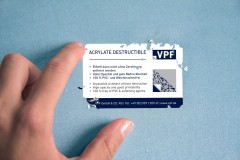VPF sets a new technological standard
Labels made of ultra-destructible security films provide optimal protection from product tampering and the counterfeiting of branded articles. Once attached, they cannot be removed without tearing into tiny pieces. However, there are problems with their production and application. The PVC and acetate materials used so far have only a limited shelf life as they contain volatile plasticisers and may still emit odours. An alternative is now available from VPF: innovative security films based on acrylate – available in white matt as well as in a fully transparent version. With the same functionality, they not only are totally free of plasticisers and PVC, but also exhibit a longer storage life while being totally odourless as well. In developing this product, VPF has set a new standard of technology.
Ultra-destructible security labels are typically used for protection from tampering before first use, for the overlabelling and anti-counterfeit serialisation of medicine packages, and for tamper-proofing or test seals on technical devices. When processed by label printers or in their end use, conventional security films based on PVC or acetate films have several disadvantages that were long considered insurmountable.
Disadvantages of PVC- and acetate-based security films
To produce ultra-destructible security films based on PVC, the addition of plasticisers is essential. However, these are released gradually and can thus give rise to such serious embrittlement that considerable problems arise during further processing. In their end use as well, after excessively long or incorrect storage, security labels may become brittle, thus significantly reducing their amenability to manual or automatic dispensing. The service life of PVC security films is therefore often limited to six months. In addition, completely PVC-free labels and packaging materials are now being demanded in numerous industries and countries. Although acetate-based security films are PVC-free on principle and have a slightly longer shelf life, they can still contain considerable process-related shares of plasticisers and solvent residues. This means they are not entirely odourless either and are therefore usually ineligible for sensitive applications in areas with consumer contact, on exclusive branded articles and on medicines.
Acrylate films: totally free of PVC, solvents and plasticisers
Leaving the drawbacks of conventional materials behind them, the acrylate security films developed by VPF are setting a totally new technological standard. They are totally free of PVC, solvents and plasticisers, which is their biggest benefit to downstream processing. They thus offer a significantly longer storage life not only on the label manufacturer’s site, but also in the various technical, medical/pharmaceutical and consumer-related end uses. Also beneficial is their excellent printability with a wide range of printing technologies. As required for the final label appliction, the new acrylate security films come in two versions – in transparent (VPF 72704) as well as white matt (VPF 72706) – both in 50 µm thickness.
A crucial role is played by the adhesives for ultra-destructible security labels formulated by VPF. These display good initial tack and final adhesion on a large variety of substrates while being neither too gentle nor too aggressive so that the extremely fragile security material can still be cleanly die-cut and reliably separated from its matrix. The new acrylate security films are supplied as standard with VPF Permanent 980 adhesive and easy-release Glassine B700-473. Permanent 980 is low-odour, suitable for direct food contact and can be used in the temperature range up to 120?°C. For challenging overlabelling applications, the matt white film can also be made available with opaque Permanent 980 dark adhesive or, for prolonged outdoor applications, with UV acrylate hotmelt HM 709 UV.
The newly developed acrylate security films are based both on modern raw materials and on VPF’s many years of experience in the field of ultra-destructible security films. They constitute a genuine product innovation and are now setting a much higher, future-oriented standard of technology.






